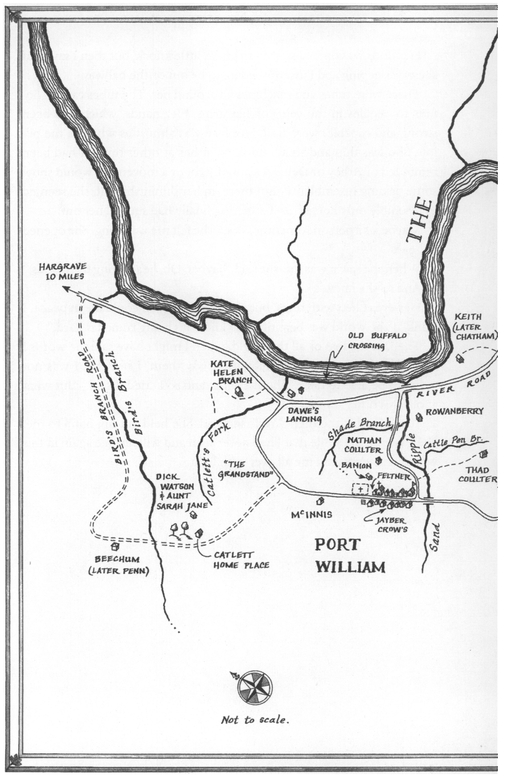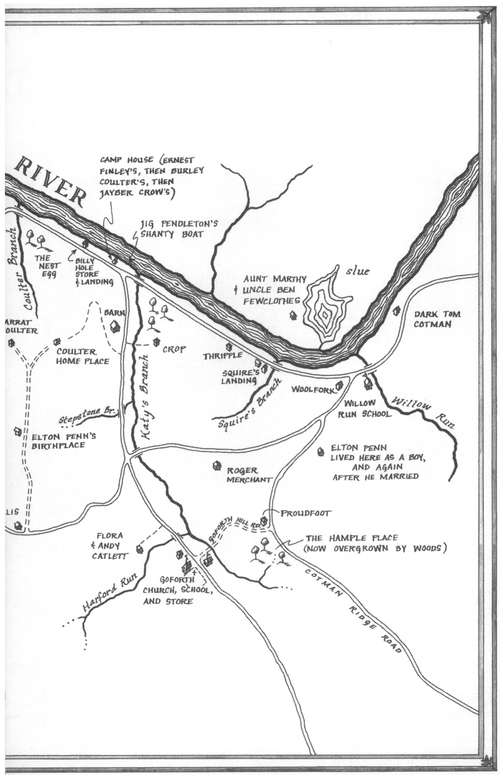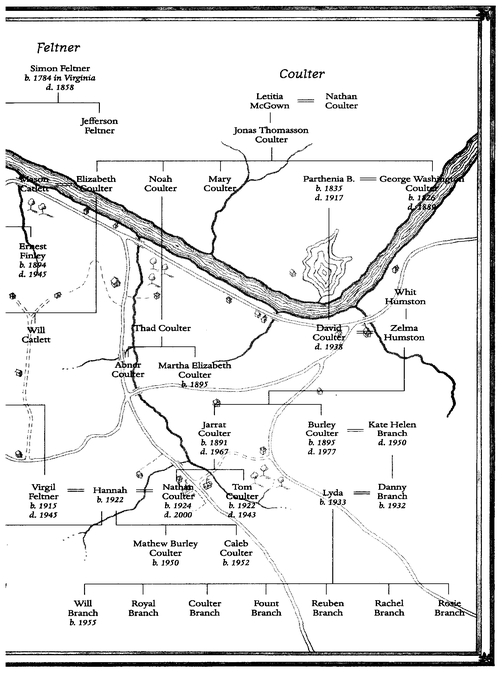Jayber Crow (53 page)
Authors: Wendell Berry

After that I was purposeful. I went like a stranger back to my strange little house. I did my morning chores, ate my breakfast, and then bathed and shaved and put on my best clothes.
Danny Branch's boat happened at that time to be once again in the era of modern transportation. The boys had got hold of another old outboard motor that they maintained at a level of respectability slightly above that of scrap metal. It was a battered, greasy old thing, much scratched and dented. From having observed the Branches, I knew roughly how to run it. I filled the tank, checked everything, and started it. I was on my way down the river to Hargrave before it occurred to me that I had done something fairly remarkable, that the motor might not have started. My only thought had been to get to Hargrave without going by road. I did not want to see anybody or talk to anybody. And I was in too much of a hurry to walk.
The day was already hot. I went humming right down the middle of the river, driving the V of my wake into the quietness. The old motor coughed occasionally as if contemplating a change of mind, but it did not stop. I did not pay it the courtesy even of looking at it.
I tied up to the bank not far above the lock at Hargrave, taking care to leave the boat where it would not call attention to itself.
Â
When I went in out of the hot light, the hospital was so dim and cool that I had to stand still to get used to it.
A lady at a desk said, “May I help you?”
I said, “Mrs. Chatham's room, if you please.”
She gave me the number and pointed.
I felt clear and free. Later, it seemed to me that I had given no thought at all to what I was doing, that from the moment I rose from sleep I merely had known.
Her door was open. I started to give a little knock, but then I saw that she was sleeping and I just tiptoed in, to be out of the hallway.
There were tubes and machines all around her. The tubes carried liquids to needles in the veins of her arms. Her hands, which had been strong and capable, were frail. Her face was almost as white as the pillow. She was thin and small. Looking at her at other times, I had been reminded of Athey or Della. A slant of light or a movement would show some passing resemblance. But there, in her diminishment, she seemed to resemble only herself, as if suffering finally had singled her out.
Maybe, as a person sometimes does, she felt me watching. She opened her eyes.
When she saw it was me, she said, “Jayber. Oh, he's cutting the woods.”
And so she knew.
Her eyes filled with tears, but she said quietly, “I could die in peace, I think, if the world was beautiful. To know it's being ruined is hard.”
Then, in the loss of all the world, when I might have said the words I had so long wanted to say, I could not say them. I saw that I was not going to be able to talk without crying, and so I cried. I said, “But what about this other thing?”
She looked at me then. “Yes,” she said. She held out her hand to me. She gave me the smile that I had never seen and will not see again in this world, and it covered me all over with light.




Copyright © 2000 by Wendell Berry
Â
All rights reserved under International and Pan-American Copyright Conventions. No part of this book may be used or reproduced in any manner whatsoever without written permission from the Publisher, except in the case of brief quotations embodied in critical articles and reviews.
Â
This book is a work of fiction. Nothing is in it that has not been imagined.
Â
The final two chapters of this book have been published by the Temenos
A
cademy
R
eview (Kathleen Raine, ed. London).
A
cademy
R
eview (Kathleen Raine, ed. London).
Â
Library of Congress Cataloging-in-Publication Data
Berry, Wendell, 1934-
Berry, Wendell, 1934-
Jayber Crow : the life story of Jayber Crow, barber, of the Port William membership, as written by himself : a novel / by Wendell Berry.
p. cm.
eISBN : 978-1-582-43689-0
1. Port William (Ky. Imaginary place)âFiction. 2. KentuckyâFiction. 3. BarbersâFiction. 4. OrphansâFiction. I. Title
PS3552.E75 J39 2000
813'54âdc21 00-035889
Â
Â
Â
Â
Distributed by Publishers Group West
Â
Other books
April's Glow by Juliet Madison
The Bones of the Old Ones (Dabir and Asim) by Howard Andrew Jones
While My Pretty One Knits by Anne Canadeo
Sexy Beast by Georgia le Carre
Kiss and Tell by Nikki Winter
Moon Cutters by Janet Woods
Secrets from Her Past: Scandalous, Book 2 by Jules Bennett
Last Call by David Lee
La inteligencia de las flores by Maurice Maeterlinck
